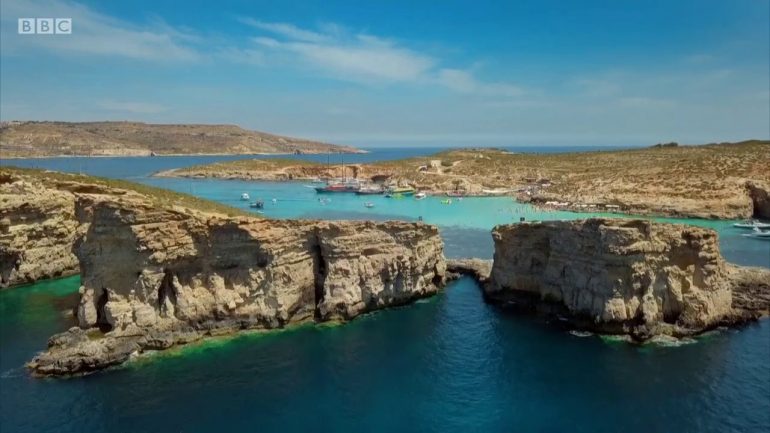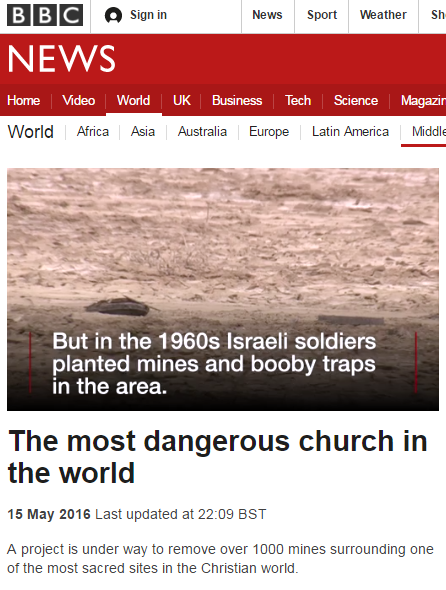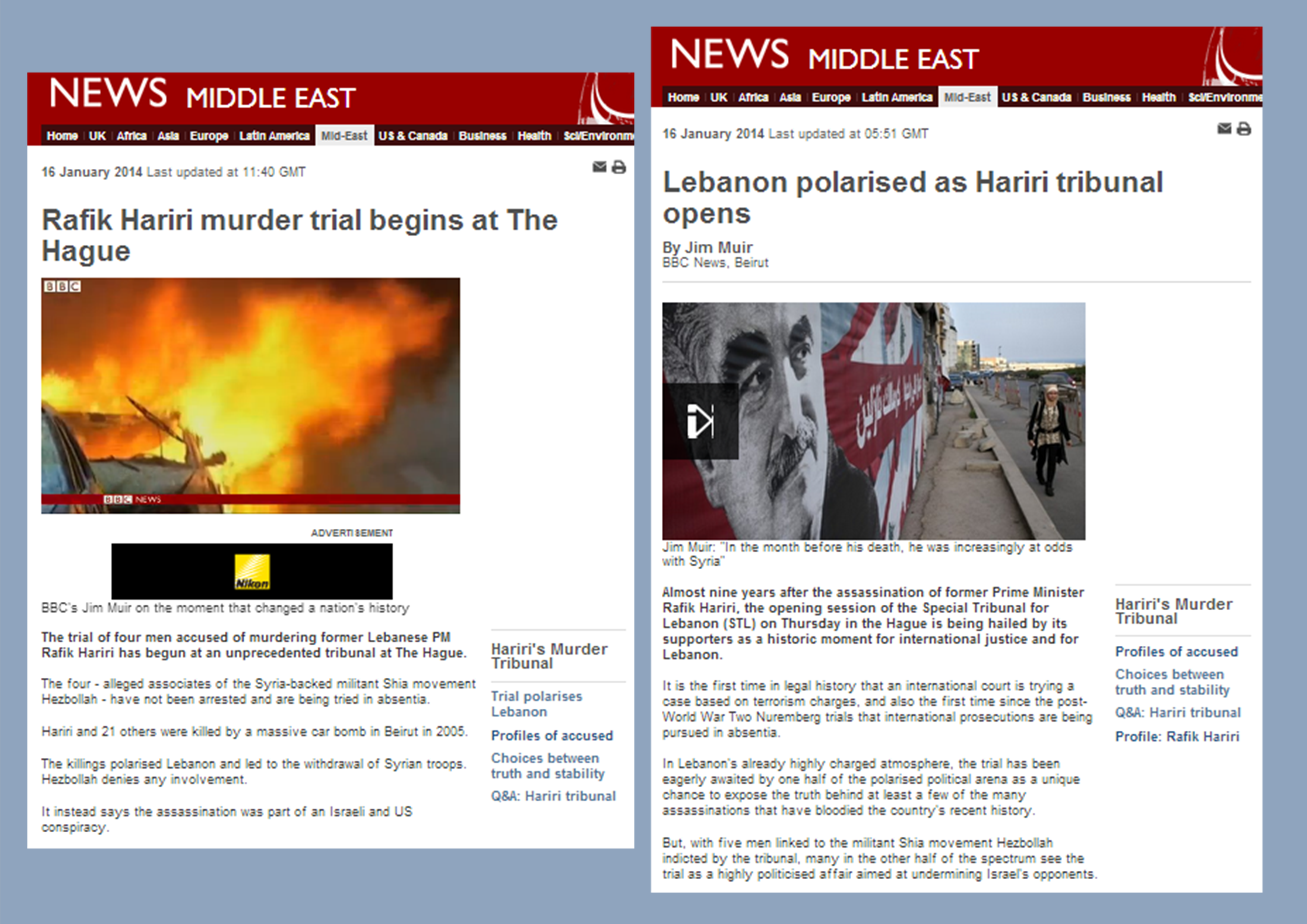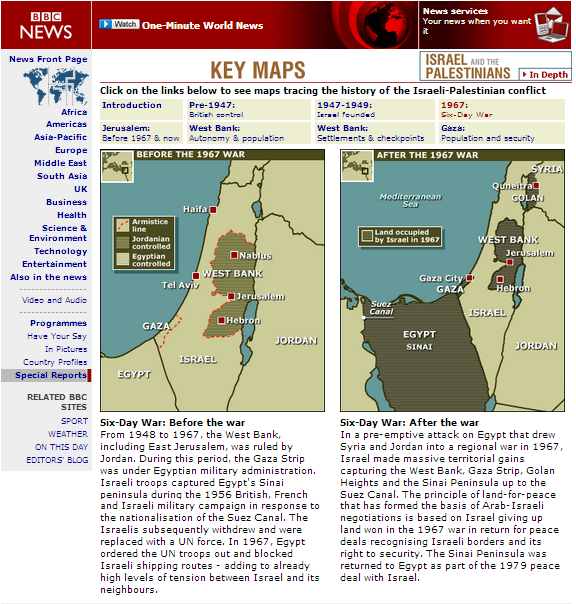BBC Two has recently been showing a four-part series titled “Mediterranean with Simon Reeve” which will be available on BBC iPlayer for the next five months.
“Simon Reeve embarks on an extraordinary four-part journey around the Mediterranean, uncovering the wild extremes that lie behind the tourist veneer.”
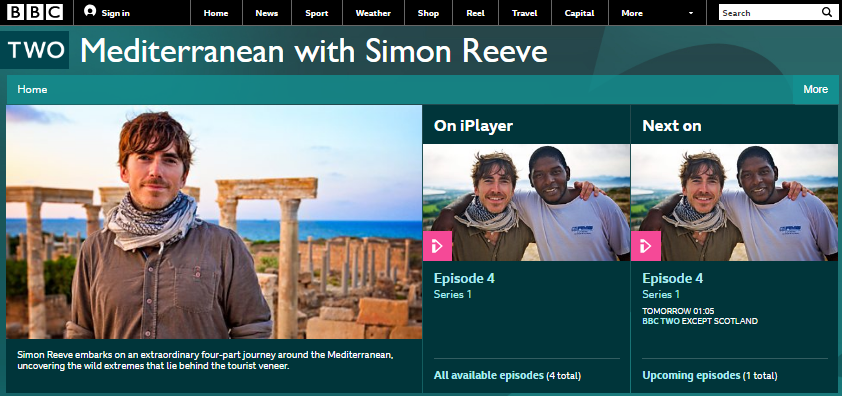
In episode two of the series (also available here) its writer and presenter visited Cyprus, Lebanon, Israel and the Gaza Strip.
“Travelling south, Simon’s next stop is Israel, a country that perhaps more than any other depends on the Mediterranean for its survival. With few friends in the region, Israel has to transport most of its goods by sea. Simon joins the Israeli Navy who patrol the coast and protect the country’s offshore oil reserves using the latest military weaponry and technology, including unmanned, combat-ready drone boats.
From Israel Simon crosses one of the world’s most heavily fortified borders to reach the Gaza Strip. Palestinians and Israelis have endured a seemingly endless cycle of violence and in Gaza the result has been devastating destruction. Many building materials are restricted by an Israeli blockade on Gaza, but Simon meets an inspiring young woman who has helped reconstruction efforts by inventing an ingenious method of making bricks from ash. It’s a rare ray of hope in one of the most troubled regions of the Mediterranean.”
Informed viewers may well have raised an eyebrow at Reeve’s failure to mention the relevant context of UN Security Council resolutions forbidding the presence of armed militias in the area of southern Lebanon he described as “territory controlled by Hizballah” while en route to visit the terror organisation’s ‘museum’.
In addition to a trip on a navy boat, Reeve’s trip to Israel included a desalination plant and a visit to “party town” Tel Aviv. At the end of his subsequent trip to the Gaza Strip Reeve declared:
“So much about the Arab-Israeli conflict is about picking a side and personally I refuse to. My heart breaks for the suffering of the Jewish people throughout history. My heart breaks for the suffering of the Palestinians. So many opportunities for real, lasting peace have been lost here and we see two sides that seem in many ways to be moving further apart, not closer together.”
That monologue however came after viewers have been presented (from 42:27) with a fifteen-minute context-free, politicised and, in parts, inaccurate view of the Gaza Strip.
After a brief reference to “missiles launched from Gaza” Reeve told viewers:
“I crossed one of the world’s most heavily fortified borders. So this is a long walk through a cage – a caged passageway that takes us from the very modern, pretty wealthy state of Israel to the much poorer and densely packed Gaza Strip. I’ve never been through a border quite like this. It is extraordinary in every possible sense and – my God – you look across here…look at the barrier that encircles Gaza. It’s a very forbidding, foreboding place to walk towards, quite frankly. There’s a…there’s a dehumanisation of the people who live here. The whole process makes you feel like you’re entering the cage of the wild animals.”
The concrete barrier near the Erez Crossing pointed out by Reeve of course does not ‘encircle’ Gaza at all. Reeve however did not bother to interview anyone from Israeli communities such as Netiv HaAsara which are protected from Palestinian terrorism by that barrier or make any effort to explain its purpose.
Having entered the Gaza Strip, Reeve teamed up with “our guide in Gaza” – failing to clarify that he is a BBC employee before viewers heard Rushdi Abu Alouf promote political propaganda.
Abu Alouf: “Of course they keep calling Gaza the biggest open-air prison which is true because it’s closed from four sides. So Israel is calling this strip of land is like a hostile entity.”
Viewers got no explanation as to why Israel declared the Gaza Strip a hostile entity in September 2007 and Reeve next misled BBC audiences with an inaccurate portrayal of how and when Hamas wrested control of the Gaza Strip from the Palestinian Authority.
Reeve: “Since elections in 2006 Gaza has been controlled by Hamas – a militant Islamic group considered terrorists by Israel and many Western governments.”
Viewers also heard a ‘creative’ portrayal of the purpose of a Palestinian Islamic Jihad military position.
Abu Alouf: “They operate in this area because it’s not far from the border so they always try to be ready for any Israeli escalation.”
Audiences were given an inaccurate (even according to previous problematic BBC reporting) account of civilian casualty figures during the 2014 conflict (47:55).
Reeve: “Israelis and Palestinians have endured endless cycles of violence. Here militants can fire rockets into Israel. Israel can attack with overwhelming force. Weeks of conflict here in 2014 between Israel and Palestinians left two thousand civilians dead, including an estimated 500 children.” [emphasis added]
He went on:
Reeve: “Eighteen thousand homes were destroyed. Israel restricts the supply of many building materials like cement into Gaza – Israel says to prevent Hamas building tunnels for attacks.” [emphasis in the original]
Reeve appears to have sourced the number 18,000 from UNOCHA – where that figure is presented as including partly damaged structures rather than the number (11,000 according to other UN reports) of dwellings “destroyed”. Of course millions of tons of dual-use goods including cement have been imported into the Gaza Strip since the 2014 conflict under a UN supervised mechanism. Reeve made no effort to inform audiences of Hamas’ proven misappropriation of construction materials for terrorism purposes that include cross-border tunnels.
Failing to explain to viewers why “Gaza is under blockade” or why electricity supplies only run for four hours a day, Reeve gave audiences a simplistic view of Gaza’s economy which failed to include any mention of the relevant topics of the policies and actions of Hamas or the Palestinian Authority.
Reeve: “But the blockade here is devastating Gaza’s economy. Gaza now has among the highest unemployment rates in the world and it’s believed most of its people survive on less than $2 a day.”
Reeve: “But today Gaza’s fishing industry is in crisis. It’s thought less than half of Gaza’s fishermen are still putting out to sea. Across the Mediterranean fish numbers are in steep decline. Here fishermen face additional challenges.”
Viewers were even told by a Gaza fisherman that fish do not come any closer than nine miles from the shore – with no challenge from Reeve.
Reeve: “This part of the Mediterranean is completely empty.”
Fisherman: “Fish can only be found nine miles out. The Israeli army only allows us to go out six miles.”
Although Reeve acknowledged that he had been unable to verify an account of an incident in which the same fisherman claimed to have been shot by Israeli forces, the BBC aired it anyway. No effort was made to introduce the relevant context of arms smuggling by sea to the Gaza Strip.
With no mention having been made of Israel’s disengagement from the Gaza Strip thirteen years ago, audiences were led to believe that Israel is “the occupier”.
Abu Alouf: “Look for young people in Gaza the only thing [they] know about the Israelis is that they are the occupier who come in tanks and aeroplanes and bomb Gaza.”
Simon Reeve ended his visit to the Gaza Strip by telling viewers of this film – categorised in the credits as a “current affairs production” – that:
Reeve: “The situation here is utterly shocking and maddening.”
Significantly, BBC Two audiences heard nothing whatsoever about Hamas’ agenda of destroying the Jewish state – or whether or not Reeve finds that and the terrorism against Israeli civilians which aims to bring that agenda about “utterly shocking and maddening”.
Clearly impartiality and accuracy were not at the forefront of priorities for the makers of this context-lite (especially in comparison to Reeve’s previous efforts to explain the Cyprus conflict) segment of Simon Reeve’s film.
Related Articles:
BBC News continues to promote dubiously sourced Gaza statistics
BBC continues to avoid independent verification of Gaza casualty ratios
More context-free BBC portrayal of Gaza construction imports

